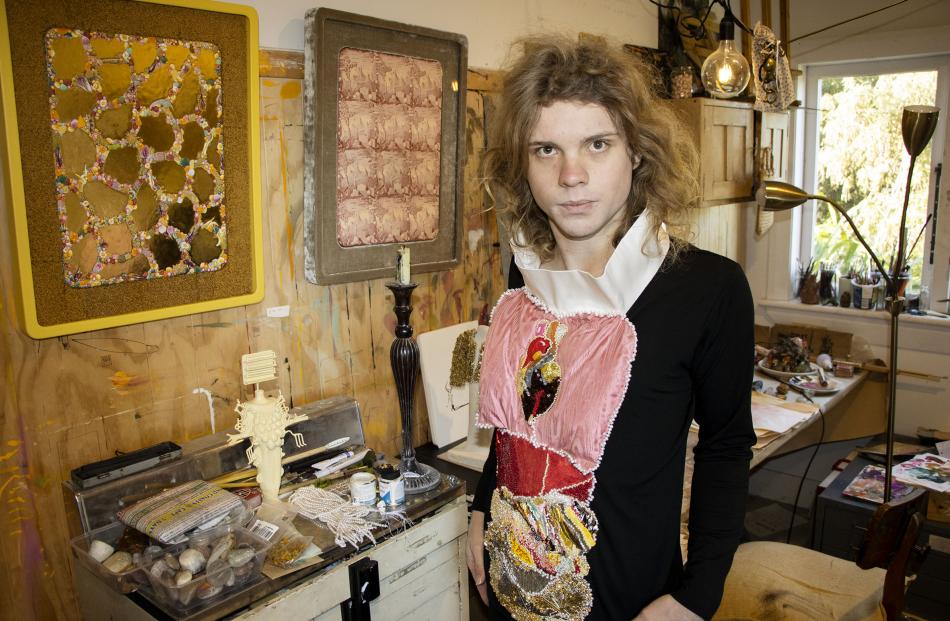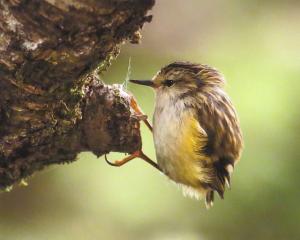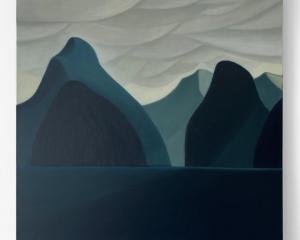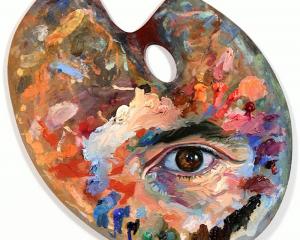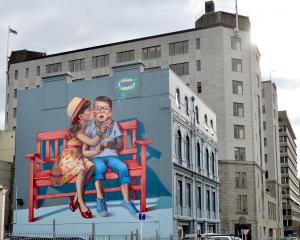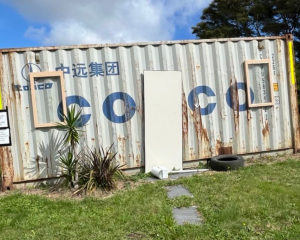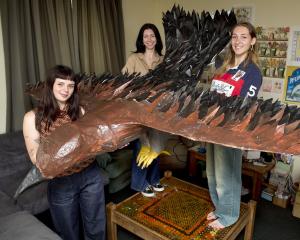Henry Turner of West Melton has become one of Christchurch Art Gallery’s youngest artists to be represented in its permanent collection. The gallery just recently bought two of his works. Susan Sandys spoke to the 22-year-old.
Tell me a little bit about yourself and your art.
Basically I’m no good at anything else. I have been doing this for most of my life, although it was only formalised about eight years ago.
What schools did you go to?
I went to West Melton School and Burnside High School.
When did you first start to draw and paint?
I can’t remember, it was before memory solidified.
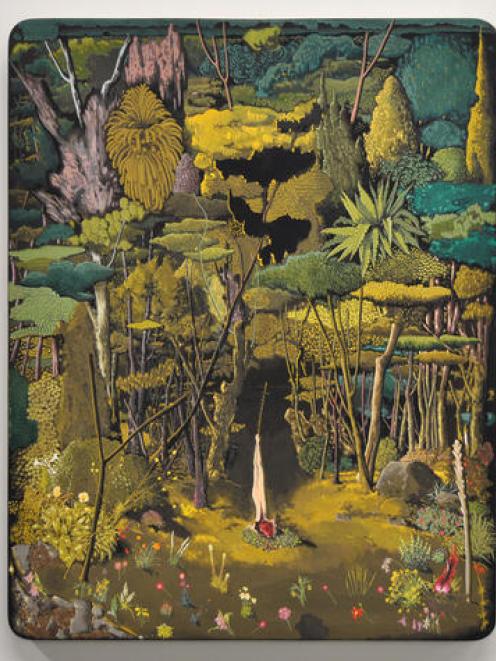
It had a sort of achievability, and a freedom, which wasn’t really in anything else. It’s like a liberation of the soul, and you can fly.
Tell me about what art forms you do.
Well I do most kinds. I do embroidery and painting and silver-making and sculpting and gardening. But I’ve barely started. I propose to get started on lapidary (caving gemstones).
Do you think gardening is an art form?
Well, I am very uninterested in art forms. It’s like making clothes, and gardening and cooking and painting. They are all in one sort of category, except the garden fights back, and it would be unwise to eat the sculpture most of the time. With the creative essence, it’s all from the same place. And everything can be fused together into a more generalised means of expression, which is what I have been aiming for.
Tell me about your recent solo exhibitions.
I do shows in different places. There’s Brett McDowell Gallery in Dunedin, City Art Depot in Christchurch. I do shows in both of those, I’m working on a show for Brett today. At the moment, it’s mainly planning more than actually painting, because some of the formats are quite complicated, but there’s a lot of gold and pearls. There was a show at City Art Depot recently (Exhibition entitled A.P.G.A., April 16-May 16), which had embroidered clothing, lots of sculpture and lots of painting. To do the painting, I used techniques you would normally use for sculpture. On the sculpture, some of them, I used techniques you would normally use for paintings. Also some of the sculptures were on the walls, and some of the paintings were on tables. So there is a sort of blurring of characteristics.
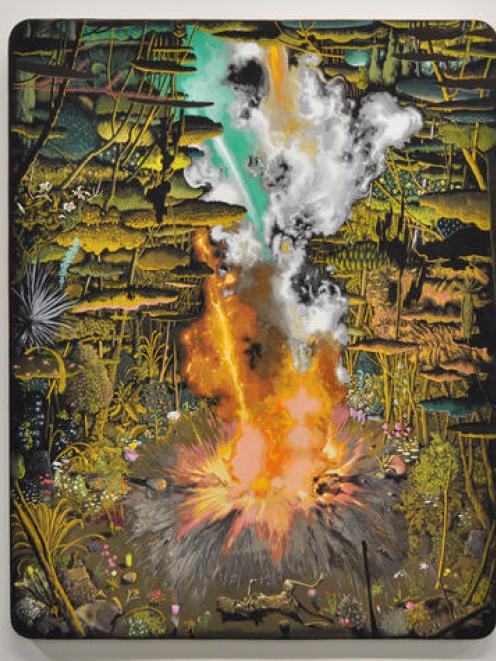
Oh yes, I did the maximum that I could. At morning tea and lunch time, and before and after school. It was really good, I spent as much time in there (art studios at the school) as I possibly could. At Burnside, there were several teachers of importance, and there was (artist) Nichola Shanley. I was never in her class. I started working with galleries through her and it was incredible.
How did Nichola Shanley help when you weren’t in her art class?
I sidled into whichever class she was teaching. And also we had morning tea together, and lunch, and went to visit each other, and it was wonderful, it really was.
So even though you were not in her class, she ended up being a wonderful mentor anyway?
Yes. Mentor, mental artist.
She opened up the whole world of exhibitions to you?
I had been doing shows for years by then, but I went to Brett McDowell Gallery because she was showing there. I was in year 10. That was of incredible importance, it was one of the best things that ever happened to me. It took years and years before I was able to do good work that I wanted to show with Brett. But I knew from then where I wanted to go. If you consider art to be work, then I have worked just about every day of my life. Whether it wasn’t actually drawing, then I was thinking about it and exercising the mind, all the time. But it’s only in the last few years, very recently in fact, that I think I have got somewhere.

It’s getting there. I started from sort of nothing. I have done it every day, but it is starting to get there, definitely.
That must be rewarding.
Can I include a metaphor? There’s this great thing the ancient Egyptians did, it’s in the Book of the Dead. When the deceased came to the afterworld – when someone died and they did the mummification as a way of sending them to the afterlife – there were all these ceremonies to make the body work again. There was the opening of the mouth, and then they could speak, which is why it was important that the tongue got preserved perfectly. Arriving dumb and unable to communicate or anything, and then the opening of the mouth, it seems quite relevant. Because once you’ve sort of got the hang of something, or at least it seems to me, you can speak, you are free. After trying so many years, I have got to a place where it feels as though a mouth has been opened. I can speak, and it is wonderful.
That is wonderful that your artistic career has taken off. I understand the Christchurch Art Gallery bought two of your works?
The (Christchurch) Art Gallery bought two big paintings a few weeks ago, that was nice. They were quite big ones, I haven’t done such big ones in a while. They were called Echoes (a) and Echoes (b). They were large forests with different things happening in them. They are gouache on panel. If you asked them and they declined to divulge (the price), I can’t really divulge it either. It was a record purchase from my experience (highest price for my work that I have achieved).
What did you do when you left school?
I went to Canterbury University. I’ve got a Bachelor of Arts. I majored in art history and minored in classics.
That’s interesting that you didn’t take the traditional route many artists take, studying fine arts?
I think some people might go to art school to get more art into their lives. But it has been my life since the year dot, so I thought I would just keep going. I was exhibiting all the time I was at university. It’s super important to exercise the mind, I turned myself into one of those German mining machines and sort of ate up everything there was. Although, I can’t honestly say I cared very much about marks. Because the stuff itself was so exciting, and I was so ravenous for it. It opened so much of the brain, and that was the important thing. But I did that solely as an adjunct to the art.
How old were you when you had your first solo exhibition?
The first time I ever showed anything in a sort of semi-formalised way was at Selwyn Arts Heart (annual Selwyn art exhibition). I think I was about 12. The first solo show wasn’t until a few years after that. I’m really bad at dates. It was drawings and paintings, mostly paintings I think. I was working a lot with oil pastels at that point, which I haven’t really done since. It is sort of drawing with lipsticks, it’s amazing.
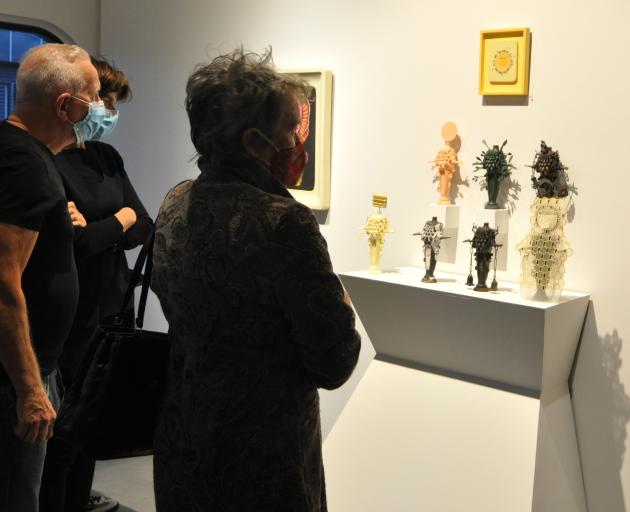
Yes, that was a sort of delayed response to a trip to the Subantarctics I did about eight years ago. I went round down there, which is another one of the best things which has ever happened to me. It was of huge importance. I went there again last year, with Nicola as it happened. So there was a lovely symmetry to it, because it was around when I first met her that I went the first time. I skipped the year 9 exams, it was great.
How did you get to go there on your first trip?
I heard that there was this scholarship. I scraped together the relevant stuff and went to see the company. I was on the ship inside the week. It was amazing.
What did you like about it?
Going to Macquarie Island (part of the Subantarctic Islands) is the rawest extreme of opposite (from civilisation) you can imagine. You go there and the penguins come up and eat you, well nibble a bit. There is this enormous biomass, which is not used to people. When you go there, if you didn’t know better, you would swear humans didn’t exist anywhere in the world.
I am curious about what other subjects you studied at school. Your morning teas and your lunch breaks and your art classes of course were spent doing art, what other subjects did you do at high school?
Well I started at Burnside in another well-known specialist department of theirs, and that was an utter disaster. That was sort of six months that didn’t happen, as far as I am concerned.
Was it music?
Yes, well you might well think that, I couldn’t possibly. I don’t want to talk about it, it was horrible. There was that, and well after that there was the usual. French was good, I enjoyed that, and maths, biology chemistry, not to any stellar results. English was fantastic.
Did your parents influence your art career?
Yes, I would say so, my parents definitely. My grandfather was an engineer. He built stuff, he built motorcars and ships and railways and steam locomotives, basically did whatever he wanted to. My mother has a lot of that, and my father is an engineer.
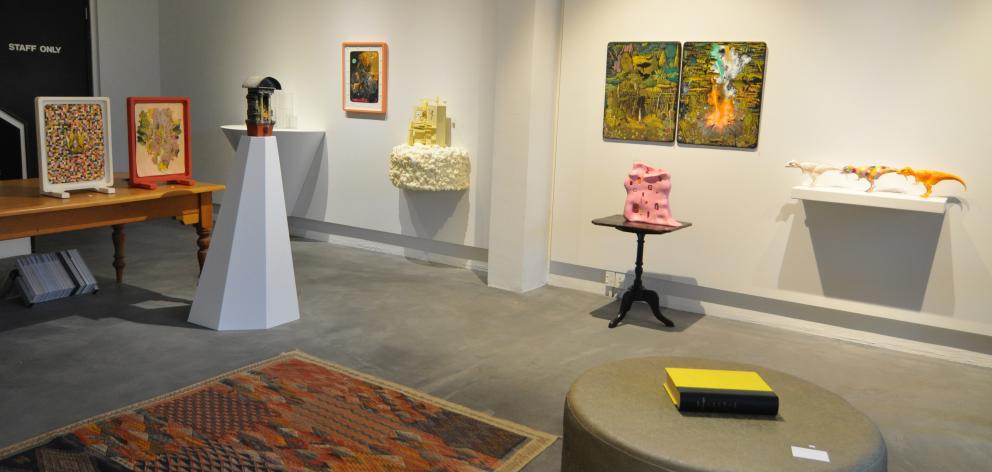
Yes. I have two younger brothers. At school they were sometimes asked if I was adopted.
Why is that?
Well, because we are so dramatically unlike. How much of it is nature versus nurture I don’t know, more of the latter I think. They are at university. My brother Max is doing biochemistry and George is an engineer. I think a lot of it is also to do with the fact that they are both very, very good at being outgoing and social. They are very good with people. Particularly at school, which I was the total opposite of that. I hardly left the art department.
I suppose that had its advantages, because you are a successful artist! Can you think of anything else to share?
I got semi-addicted to methadone once for about five weeks. It was the holidays before year 11 started. I haven’t used the colour blue since. The sky became sort of terrifying, and it became sort of a tic. It was after a big spinal operation. I have a deformed spine. It had to be modified. I can’t remember if the instructions weren’t said loudly enough, or not listened to hard enough (regarding the recommended prescribed dosage for post-operative pain relief). That was probably the worst thing that ever happened to me, the withdrawal. It was a pretty softcore addiction compared to other substances that are around, but it was quite unpleasant I must say.
It’s a shame you have not been able to use the colour blue since then, blue is a beautiful colour.
Yeah, I’m sure it is. There are times when I think: ‘Maybe if i just use a little pale blue.’ Well, I’m quite obstinate. I may as just well continue. I do quite like a nice teal green though.
Can you wear the colour blue?
Oh yeah. I almost always wear black. Or sometimes white. But mostly black. Maybe blue now and then. My friend Sharon Ng does these wonderful black shirts which I wear. It also takes embroidery quite well. The last one had so much glass beading it was like wearing a large tank. It weighed about two kilos.

